Reflections on a pilgrimage
Director of Sydney's Aquinas Academy, Fr Michael Whelan SM, reflects on the Academy's pilgrim experience in India.
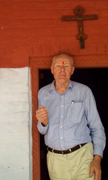
“It is pilgrims we are, wayfarers on a journey, and not pigs, not angels.”
[Walker Percy, Love in the Ruins: Adventures of a Bad Catholic at a Time Near the End of the World, Avon Books, 1978, 104.]
|
Pilgrimage is a physical thing. It is also a deeply human thing, a spiritual quest.
You leave your home on foot or by some other means of transport and you go to a place or places recognised as sacred.
It is more a leaving than an arriving, more about process than content. It is an act of abandonment and surrender, an act that can set in train – or give more impetus too – a life of abandonment and surrender.
You should not go on pilgrimage unless you want to grow and therefore change.
Our taken for granted worlds can be analgesic. Habit and routine – especially unreflective or busy habit and routine – can have us sleepwalking through life, forgetful of what really matters.
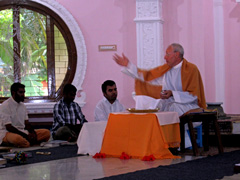
The unawakened and forgetful life is not a good life. It too easily allows the illusion of control to dominate us.
Sometimes we need to do something, something concrete and demanding, something different and challenging, to make us aware that there is more to life than we are allowing.
Then, paradoxically, when we do return to our taken for granted world it is no longer a world we can take for granted.
We awaken to the “more than” present in every person, every event, every thing, every place.
Pilgrimages can remind us that the world is sacrament – in the temporal we can encounter the eternal, in the finite we can encounter the infinite, in the material we can encounter the spiritual, in the human we can encounter the divine, in the ordinary we can encounter the extraordinary – if we are awake.
On September 19 of this year I went with twenty other pilgrims to India. We landed in Chennai (Madras) where St Thomas the Apostle was martyred, travelled down the coast visiting various sites.
We celebrated Eucharist in the Shrine of Our Lady of Good Health at Velankanni – “the Lourdes of the East”.
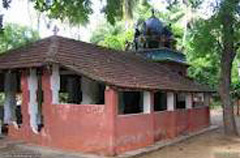
The centre of the pilgrimage was four days at the Saccidananda ashram. Accommodation was basic – very basic – helping us to focus on what matters. It is amazing what you can do without.
We joined the Camaldolese community for prayers and Eucharist. They gave us some instruction on the spiritual life and yoga practices. It is difficult to imagine someone experiencing the life of the ashram and remaining untouched.
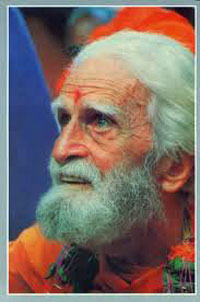
top of next column... |
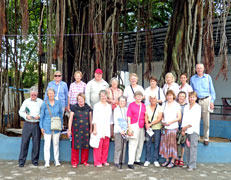
We then travelled west across to Kerala and Goa where the incorrupt body of St Francis Xavier is kept in a basilica.
We returned to Australia on October 6. Along the way we reflected on the Gospel of the day and had meetings for reflection, prayer and conversation.
Contradictions, paradoxes, confusion, embarrassment, anger, joy, peace, fatigue, insight, enlightenment, can all be present – sometimes together! – in the experience of pilgrimage. It is the nature of a pilgrimage to be unpredictable.
Surprises are one very good way by which we are awakened to the “more than”. The intention is, after all, to wake us up from what might be – typically is for those of us who have grown used to an affluent culture – an unawakened state.
The pilgrimage cleared my mind to think a little more about the comfortable and safe life I lead as a priest in a comfortable and safe suburb of a comfortable and safe country.
The question arises: Can I – may I – go on living this way? Do I even want to go on living this way? I’ll be seeking to respond to these and other questions in the coming days. For starters, though, the tradition of asceticism – especially fasting – seems worth re-visiting.
The historical evidence of the Catholic Church’s presence – particularly via the Portuguese – also raises complex questions and ambiguous feelings.
The legend of St Thomas the Apostle seems to have little or no academic evidence to support it.
Yet the belief is so much a part of the culture that we would be foolish to dismiss it.
There is, for example, a Jewish synagogue in Goa dating back to the 1st century.
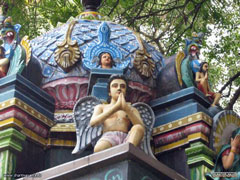
There was also a trade route that had ships from Europe going to and from India in that same century.
Why is it so preposterous to think that one of the Apostles went there? I find the legend quite attractive really.
However, I do not find the bloodied crucifix used by the Dominicans in the Inquisition – yes, the Inquisition was active in Goa – attractive.
This crucifix – found today in the same basilica where St Francis Xavier’s incorrupt body is kept – was used to motivate repentance and/or conversion in the 16th and 17th centuries. Muslims and Jews were hounded out and Christians were threatened.
Even when I try to allow for differing historical times and cultures, I cannot understand how this sort of behaviour could be reconciled with the person and teaching of Jesus Christ.
I am forced to wonder whether there are any anomalies in my own life, anomalies I am not yet awake too.
Every pilgrimage is, in the end, a reminder – more or less effective – that life itself is a pilgrimage.
The more we know the more we know we do not know. The question then is not whether we journey on but how we make that journey. |

